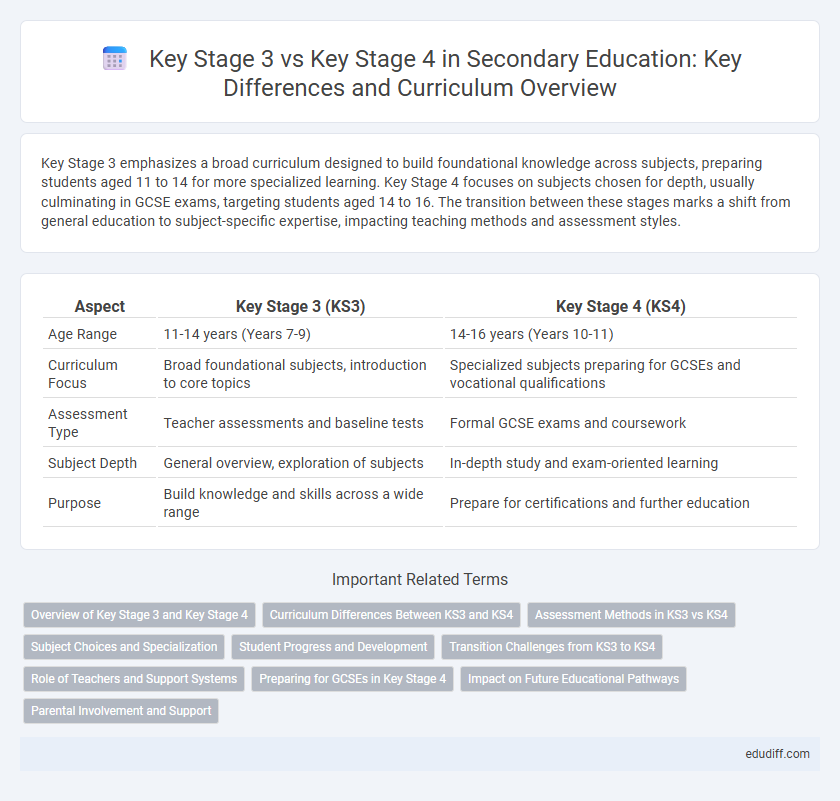Key Stage 3 emphasizes a broad curriculum designed to build foundational knowledge across subjects, preparing students aged 11 to 14 for more specialized learning. Key Stage 4 focuses on subjects chosen for depth, usually culminating in GCSE exams, targeting students aged 14 to 16. The transition between these stages marks a shift from general education to subject-specific expertise, impacting teaching methods and assessment styles.
Table of Comparison
| Aspect | Key Stage 3 (KS3) | Key Stage 4 (KS4) |
|---|---|---|
| Age Range | 11-14 years (Years 7-9) | 14-16 years (Years 10-11) |
| Curriculum Focus | Broad foundational subjects, introduction to core topics | Specialized subjects preparing for GCSEs and vocational qualifications |
| Assessment Type | Teacher assessments and baseline tests | Formal GCSE exams and coursework |
| Subject Depth | General overview, exploration of subjects | In-depth study and exam-oriented learning |
| Purpose | Build knowledge and skills across a wide range | Prepare for certifications and further education |
Overview of Key Stage 3 and Key Stage 4
Key Stage 3 covers students aged 11 to 14, focusing on broad foundational subjects such as English, Mathematics, Science, and Humanities to build essential skills and knowledge. Key Stage 4, for ages 14 to 16, emphasizes more specialized study with students preparing for GCSEs, concentrating on core subjects alongside chosen options to support academic and vocational pathways. The transition between Key Stage 3 and Key Stage 4 marks a shift from broad curriculum exposure to targeted qualification attainment essential for further education and career opportunities.
Curriculum Differences Between KS3 and KS4
Key Stage 3 (KS3) curriculum emphasizes a broad foundation across core subjects such as English, mathematics, science, history, and geography, encouraging exploration and skill development. In contrast, Key Stage 4 (KS4) tailors learning to more specialized subjects aligned with GCSE examinations, allowing students to focus on areas of strength or interest. The shift from KS3 to KS4 involves increased depth, exam preparation, and a reduced number of subjects to accommodate targeted academic achievement.
Assessment Methods in KS3 vs KS4
Assessment methods in Key Stage 3 emphasize formative approaches such as regular classwork, quizzes, and teacher observations to monitor progress and inform teaching strategies. Key Stage 4 shifts toward summative assessments, notably GCSE exams, which provide standardized evaluations critical for future academic and vocational pathways. Continuous assessment in KS3 fosters foundational skills, while KS4 assessments prioritize subject specialization and measurable outcomes.
Subject Choices and Specialization
Key Stage 3 covers a broad curriculum designed to give students foundational knowledge across core subjects such as English, Maths, Science, and Humanities, allowing exploration without early specialization. Key Stage 4, in contrast, involves focused subject choices where students typically select 8-10 GCSE subjects, enabling specialization and deeper study in areas such as sciences, arts, or vocational courses. This progression from a broad curriculum to subject specialization prepares students for further education pathways and career-oriented skills.
Student Progress and Development
Key Stage 3 covers ages 11 to 14, focusing on broad foundational knowledge across subjects to build critical thinking and learning skills, while Key Stage 4, for ages 14 to 16, emphasizes subject specialization and preparation for GCSE exams, influencing student progress through targeted assessment. Student development during Key Stage 3 centers on exploration and cognitive growth, whereas Key Stage 4 concentrates on mastery and application of knowledge to achieve academic qualifications. Progress tracking in Key Stage 4 becomes more rigorous to support performance outcomes and future educational pathways.
Transition Challenges from KS3 to KS4
Transition challenges from Key Stage 3 to Key Stage 4 primarily include adapting to increased academic rigor and a broader curriculum that demands higher-order thinking skills. Students often face difficulties balancing new GCSE coursework expectations with extracurricular commitments, which impacts time management and stress levels. Effective pastoral support and targeted intervention programs are critical for mitigating these challenges and ensuring successful progression.
Role of Teachers and Support Systems
Teachers in Key Stage 3 play a crucial role in building foundational knowledge and skills, employing diverse teaching strategies to engage students across core subjects. In Key Stage 4, educators focus on exam preparation and subject specialization, providing targeted support to meet GCSE requirements and individual learning needs. Support systems such as mentoring programs, personalized learning plans, and extra-curricular tutoring are essential in both stages to enhance student performance and confidence.
Preparing for GCSEs in Key Stage 4
Key Stage 4 is critical for preparing students for GCSE exams, emphasizing subject-specific revision and exam techniques to enhance performance. Curriculum content is more focused and rigorous compared to Key Stage 3, with increased expectations in core subjects like English, Maths, and Science. Targeted assessments and controlled practice exam conditions during Key Stage 4 improve student readiness and confidence for final GCSE examinations.
Impact on Future Educational Pathways
Key Stage 3 establishes foundational knowledge across core subjects, crucial for informed options during Key Stage 4, where students specialize and prepare for qualifications like GCSEs. Performance and subject choices in Key Stage 4 significantly influence access to post-16 education routes, including A-levels, vocational courses, or apprenticeships. Early engagement and achievement during these stages determine opportunities for higher education and future career prospects.
Parental Involvement and Support
Parental involvement in Key Stage 3 emphasizes establishing consistent communication between teachers and families to build a strong educational foundation. In Key Stage 4, support shifts toward helping students manage increased academic pressure and preparing for crucial exams like GCSEs, with parents playing a vital role in encouragement and organization. Effective parental engagement during both stages significantly enhances student motivation, achievement, and emotional well-being.
Key Stage 3 vs Key Stage 4 Infographic

 edudiff.com
edudiff.com